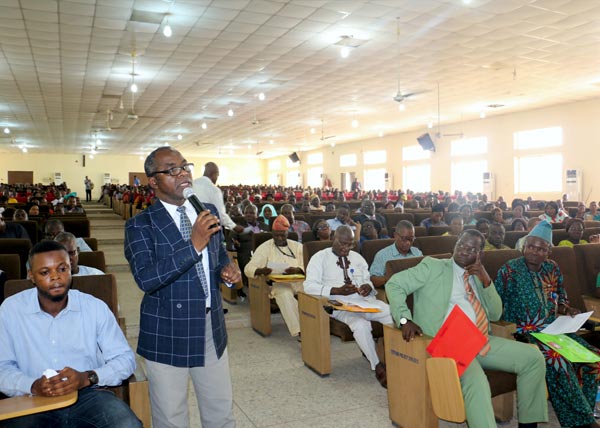The Provost, Anti-Corruption Academy of Nigeria(ACAN), Keffi, Nasarawa State, Professor Sola Akinrinade, has opined that corruption in any form was destructive to good governance and overall welfare of the society. Most importantly, he emphasized that corruption in the educational sector was even more calamitous in terms of its negative impact on our society. The Provost added that this was especially so in higher education, where the so-called leaders of tomorrow were being produced.

Professor Akinrinade who was speaking at a Capacity Building Workshop for Senior Staff of Olabisi Onabanjo University organized by the Independent Corrupt Practices and Related Offence Commission (ICPC) in conjunction with the Anti-Corruption Academy of Nigeria (ACAN) revealed that by corrupting the educational system, public trust in higher education would be greatly undermined, quality would be compromised, values would also be distorted and unqualified young professionals would be released into the political and economic life of the society.
Akinrinade stated further that corruption had compromised the output of the University system, including its research output, thus making it dangerous to predicate national development plans, policies and programmes on such faulty research outputs. He listed the various indices of corruption in higher education to include rampant sexual harassment, admission racketeering, teacher’s absenteeism, poor quality teaching/recycled notes, examination misconduct on part of staff and students, including purchase of grades and plagiarism.
However, Professor Akinrinade observed that corruption in Nigerian higher education was nothing new either was it a localized problem. He emphasised that the problem started from outside the shores of Nigeria.
While making her own presentation, the Director, Public Enlightenment of ICPC, Mrs. Rasheedat Okoduwa identified lapses in organizational structure and control as one of the major causes of corruption. She explained that lack of policies to guide organizational processes, unclear rules and regulations, non-rotation of staff, inadequate resources, ostentatious lifestyle, as well as lack of transparency and accountability were some of the contributing factors that encourage corruption in a system. She specifically mentioned politicization of appointments and promotion; and staff in sensitive positions not going on leave, as major contributing factors to corruption in tertiary institutions.
Okoduwa, therefore, suggested some administrative measures to control corruption among which were the establishment of Anti-Corruption and Transparency Units (ACTUs), formulation of whistleblower protection policy and development of clear policies on the different areas of operation in the University.
Earlier, in his opening remarks, the Vice-Chancellor, Professor Ganiyu Olatunji Olatunde had stated that the Capacity Building Workshop was the first of its kind to be organized by ICPC for Senior Staff in any University in Nigeria. He said that the Workshop was purposely organized to sensitize staff on the forms, patterns and consequences of corrupt acts on their dignity and how these would affect their integrity on the job.
The Vice-Chancellor noted that corruption had been with us in Nigeria from time immemorial and that the cankerworm had eaten deep into the fabric of the nation. He revealed that it was no longer news that Nigerian Universities had been infested with the plague of corruption. Speaking further, Professor Olatunde added that corruption and impunity had adversely affected the governance of our Universities and the quality of education received by students.
According to him, corruption in the universities had taken different dimensions, manifesting in unfair allocation of grades, contract inflation, mobilization for NYSC before graduation, nepotism, diversion of university funds for personal use and certificate racketeering.
Other speakers at the 3-Day Workshop included Mr. Ahmed Abdul, a Superintendent with the ICPC, the Deputy Vice-Chancellor (Administration), Professor (Mrs.) Ebun Oduwole, the Registrar, Mr. Femi Ogunwomoju and the Bursar, Mr. Semiu Makinde.

